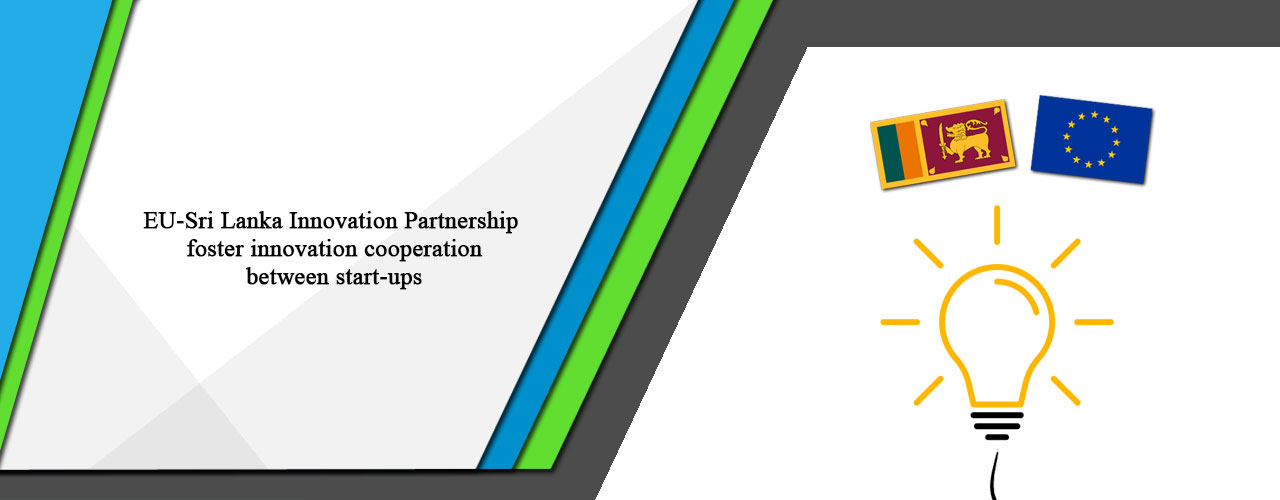EU-Sri Lanka Innovation Partnership foster innovation cooperation between start-ups
The EU-Sri Lanka Innovation Partnership (EU-SLIP) initiative has been fostering innovation cooperation between Europe and Sri Lanka since 2020 with the ambition of reaching out to other countries in South Asia, local media reports stated.
According to reports, the initiative has brought together tech start-ups, incubators and accelerators from the EU, Sri Lanka and South Asia to stimulate networking, innovation collaboration, boost business co-creation, and technology commercialisation.
Several results have reportedly been reached so far and they include:
-
*Creating a network of European and Sri Lankan incubators/accelerators to promote joint activities and start-up exchange programmes;
*Setting up the EU-South Asia Startup helpdesk to provide practical support to start-ups seeking access to new markets;
*Organisation of events on innovation, disruptive solutions and commercialisation of new ideas.
In terms of numbers:
*Over 20 European and Sri Lankan incubators/accelerators have joined the EU-SLIP network, with eight ongoing EU-Sri Lankan incubator partnerships.
*More than 24 start-ups have requested EU-SLIP helpdesk support to reach out to new markets.
*18 start-ups have submitted applications to participate in the EU-SLIP agri-tech thematic platform.
*More than 10 investors and companies have launched open innovation calls for European and Sri Lankan start-ups.
*Exchanges on commercialisation have been initiated with five Sri Lankan University Business Linkage Cells (UBLCs).
EU Ambassador to Sri Lanka and the Maldives Denis Chaibi has been quoted as saying, “It is encouraging to see the enthusiasm and initial results of the EU-SLIP in boosting innovation and business collaborations.”
He has further noted, “There is more work to do on digital transformation, investing in decarbonisation technologies, and socio-economic innovations to bring about positive change in people’s lives.”
Jean Christophe de Tauzia, the Director General of Incubateur Descartes, a French incubator that has partnerships with two Sri Lankan incubators, has been quoted as saying, “The EU-SLIP project helps incubators to better understand start-ups opportunities and needs in both regions. The Sri Lankan colleagues are very keen on collecting and implementing best practices. It is a great pleasure to work with them.”
Prof. Rohan Munasinghe, the Director of the University Business Linkage Cell at the University of Moratuwa in Sri Lanka with an active collaboration with a European incubator has noted “With the support of the EU SLIP, we are going to design and implement a new course module on entrepreneurship for university students. We don’t have such a program yet and it is an important missing piece right in the foundation. We are working closely with EU consultants, gathering their good practices, to prepare an effective program here at University of Moratuwa. I hope it will bear fruits within this year.”
The EU-SLIP initiative will continue throughout 2021 and to find out more on how to benefit from the future EU-SLIP project activities, see https://startupsl.lk/euhelpdesk/index.html#home-target or email eu-srilanka@servicefacility.eu
OSL take:
The EU and Sri Lanka enjoy strong bilateral and trade ties while Sri Lanka also enjoys benefits of EU’s GSP Plus trade concessions. Sri Lanka’s exports sector has been greatly benefited by the trade concessions. Sri Lanka’s economy meanwhile is expanding in all key economic sectors opening up many business/investment opportunities to foreign businesses/investors. The island is also becoming a business hub in the South Asian region given its geographical positioning in the Indian ocean and the many trade agreements as well as trade concessions enjoyed by the country. It is in this backdrop that Sri Lanka and the EU are further enhancing their business and trade ties. EU businesses/investors could therefore confidently explore business/investment opportunities in Sri Lanka while also look at forming joint ventures/partnerships with Sri Lankan businesses.
| Article Code : | VBS/AT/20210506/Z_2 |

